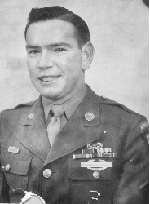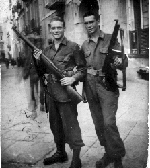Editor's Note: The following are some excerpts from the story of U.S. Army 82nd Airborne paratrooper James Geach's chapter in The Hero Next DoorTM. Jim Geach lost his final battle against cancer just a few months after the publication of The Hero Next DoorTM
U.S. Army Paratrooper Jim Geach spent most of World War II jumping into action. As a pathfinder among the paratrooper ranks, Geach often parachuted in dark silence behind enemy lines to sneak ahead and set up observation points or operate patrols for others to follow.
It was a dangerous job Geach performed heroically through some of the European Theater's biggest battles and in the greatest invasion ever waged, the D-Day Invasion at Normandy, France. It was there that Geach was awarded the Distinguished Service Cross, the second highest award for bravery. He was subsequently inducted into the Fort Bragg, N.C., Hall of Heroes for his D-Day valor.
Paratrooper James Geach parachuted with 27 other pathfinders (also from the S-2 Intelligence Section of Headquarters Company, 1st Battalion) into St. Marie Eglise on the Cherbourg Peninsula for 33 days of intense fighting beginning in the early morning hours of D-Day, June 6, 1944.
It was about 29 days later that the headquarters company Geach was with received a field phone call from a nearby 1st Battalion company taking heavy fire from a German tank and infantry. The company had dwindled from some 250 down to 15 men and had lost all its officers and noncoms. They were getting disorganized and demoralized. It was an especially precarious situation since most infantry units didn't have their own tank support and only their service weapons, hand grenades and occasional rocket launchers to fight German tanks with. The company needed help and a Lt. Col. Teddy Sanford sent in Capt. Knuckles, who asked Geach to come along. The two responded rapidly and heroically.
"The first thing we had to do was stop that tank. Capt. Knuckles asked for someone to take the bazooka (rocket launcher) and go up a hedgerow and try to knock out the tank. Nobody wanted to go and I could understand that because they were so demoralized. So I volunteered, though I had never fired a bazooka before.
"I ran across an open field with German infantry shooting at me to get to a hedgerow on the other side of the road. I found a farm equipment entrance with a big wooden gate and hid behind it.
"The tank was almost up to me, though the road by the gate was deeper than the field so I couldn't see it. I knew it was coming closer because I could hear and feel it rumbling. It was so close that I thought that if I hit the side of the tank I'd have to worry about shrapnel coming back at me.
"The tank almost came up to my position where I could have gotten a great shot but then it stopped just short and all I could see of it was a few feet of its barrel. Then it fired and the ground around me just shook. I thought, I can't let it fire at those guys again!
"So, I aimed as best as I could and shot at the barrel. Now, if we were in a movie, that would have gone right down the barrel and the tank would have blown up. But that's not how things work in real combat.
"Instead the shot missed and hit the bank behind it. So I fired another couple of rounds and that scared them good! They pulled back so fast they were running into ditches and everything! I think the tank thought our artillery was zeroing in."
The problem was there were six infantry with the tank. The infantry had sought shelter in a hedgerow. Alone, Geach attacked the enemy infantry and quickly killed four with his rifle as the other two retreated.
Though they never saw the tank again, Capt. Knuckles and Geach realized the company would still need help to take out some Nazi pillboxes and a building up ahead. They remembered that a company close by had tank support. As the rest of the company moved up the hedgerow, Geach ran to get those tanks in on the fight.
He got to them and the tank drivers offered him a ride into position. "I said 'no thanks. I'm going to take my chances on the ground. I didn't want to get blown up in one of those things. The ground had kept me alive just fine so far, thank you.'
"So, I ran all the way from there to where I had shot the tank and then led our tanks into a field and into position. By this time the enemy had launched a strong counter attack. There was plenty of machine gun and small arms fire at us, especially when we hit the field, but I just kept running. And, our tanks took out the pillboxes and the building."
Geach made that dangerous dash without much thought to his own safety and more thought on keeping the company going and winning the fight. "The job had to be done and you just assume you're going to stay alive. You don't have any idea how you're going to stay alive but you really don't have time to think much about it anyway."
Geach and Capt. Knuckles were soon relieved by fresh troops and sent back to their headquarters unit where they continued to push their way into France. And, he recalls, that after 33 days of fighting in Operation Overlord, Geach's division continued on with just 41 of its 113 officers and 956 of its 2,281 soldiers.
It would be five months before Geach would learn he was to win the Distinguished Service Cross for his effort that day, with a citation that read, "for extraordinary heroism in action against the enemy on 5 July, 1944, in France ... the personal bravery, initiative and gallantry exhibited by PFC Geach reflects great credit on himself and the Armed Forces."
In fact, Geach's actions that day made such an impression that he is included in the Department of the Army, 82nd Airborne's annual training guidance manual. His actions are cited as why it's important for every trooper to be trained to use every weapon, because in combat, you never know what you may be called upon to do.
ITALIAN SEASONING
It was a lesson Geach learned well during the fierce fighting he'd endured in Italy long before the D-Day invasion.
Geach first arrived in World War II in North Africa then with the regimental "commando platoon." He came to North Africa just as the fighting there was dwindling and just in time for the first invasions of Italy, the invasion of Sicily.
Geach's glider company faced strong resistance from both the Nazi and Italian enemy as he and his other rookies in combat struggled to secure the airport at Gela, about 15 of his company were killed.
More tragically, Geach recalls many of the paratroopers and glider units flying in to fight that day never even made it out of their planes because of a friendly fire incident involving the U.S. Navy. At first the War Department denied it until veterans went home and started talking to newspapers but eventually the Navy admitted to shooting down 27 Allied aircraft on their way into Sicily. With 27 troopers in every plane and 15 soldiers in every glider, it was a tremendous loss of life.
It wouldn't be the last time Geach would witness tremendous loss of life, though from then on it was mostly the enemy's doing.
Geach's division was back in North Africa as a reserve unit as the 1st, 3rd and 36th division headed into the Salerno Invasion Sept. 15, 1943. Those divisions were struggling to establish a beachhead against heavy resistance.
So just 15 days after Sicily, Geach and company got an urgent call back into battle.
"After a dinner of C-Rations we were just sitting around and all of a sudden the whistles started blowing and we knew we were going back in," he recalls.
His company was put into Salerno by LCIs, infantry landing craft, behind the German's position to divert the enemy's attention from the beach since they would now have to fight on two fronts.
Though they were now seasoned veterans, Geach says they were still scared. "I was scared like everybody else. But the difference going in now is we were experienced. We were a little more confident and knew what to expect."
But that doesn't mean there still weren't lessons to learn.
After Salerno, Geach and other Pathfinders had to establish an observation point on Mount San Angelo. By this time they were used as regular ground infantry having landed days before and now working as Pathfinders on the ground.
"We set up an OP on Mt. San Angelo just south of Naples so we could observe the Germans. The OP was between the two artilleriesthere's and ours. They were lobbing shells over our position and to get to the other side they had to get as close to the top of the mountainand usas possible.
He remembers the feeling of a big bomb hitting near his positiona frequent occurrence. "The dirt would roll down on you inside and the ground would tremor. We would often hear them whistling which sounds bad but that's what you want to hear because they generally would be past you before you could hear them whistling, especially the German 88s. So if you heard the whistle, you were safe."
The Pathfinders made their OP in a big bomb crater the Germans had occupied until Geach's unit kicked them out.
It was in the struggle for the bunker that Geach learned a valuable combat lesson. "I had already learned the importance of cover and staying concealed and about not being grouped up together so the Nazis could pick you off easy with a mortar shell," he explains. "That night I learned not to trust things I see and hear blindly. They are not always as they appear.
"When we were going up the side of the mountain the Italians had a lot of goats on the side. And all these goats wore bells. You could hear those bells ringing constantly. So after we kicked the Germans out, that next night we could hear those bells and just assumed they were the goats.
"What we didn't know was that the Germans had taken the bells off the goats and were wearing them to camouflage their own sounds as they launched a counterattack against us. They were in our lines, right among us, before we even knew it.
"That was really scary; it just happened so fast. We were taken completely by surprise," Geach recalls.
It took Geach and the Pathfinders three to four hours to end the assault in mostly hand to hand and close fighting, a horrific fight he prefers not to recall. "We killed most of them but a few got away."
For all the combat he survived and all the accolades he received for his serviceGeach was most thankful for just surviving the war and having the opportunity to live a good and happy life.
"Not a day goes by that I don't feel guilty for being one of the lucky ones that made it home to enjoy this life with my wife, four wonderful children, grandchildren and great-grandchildren."
Read more about James Geach such as how he led reconnaissance patrols behind German lines across France and Holland, crashed landed into the Market Garden Operation, won the Silver Star and help liberate a concentration campin his chapter in The Hero Next DoorTM.


